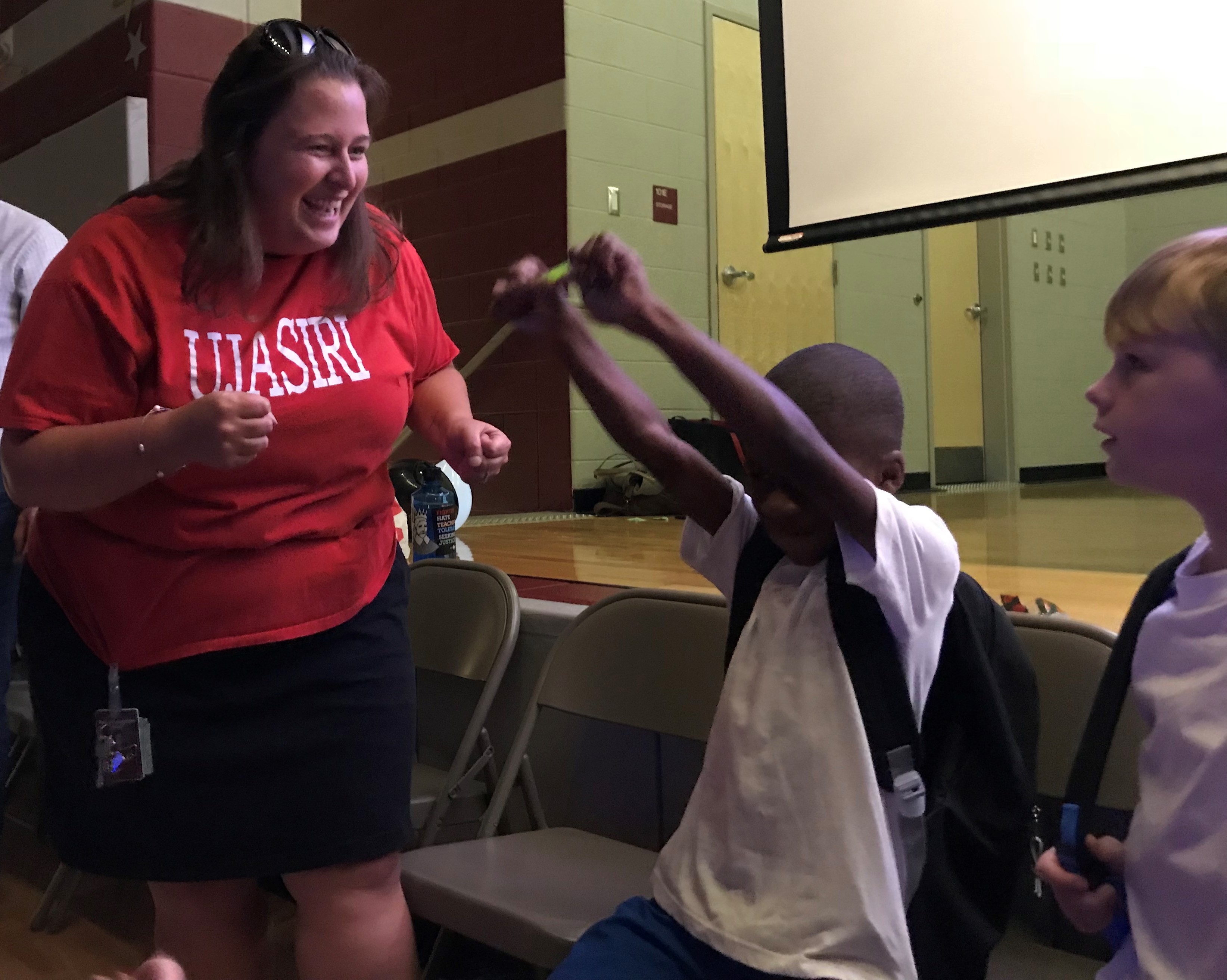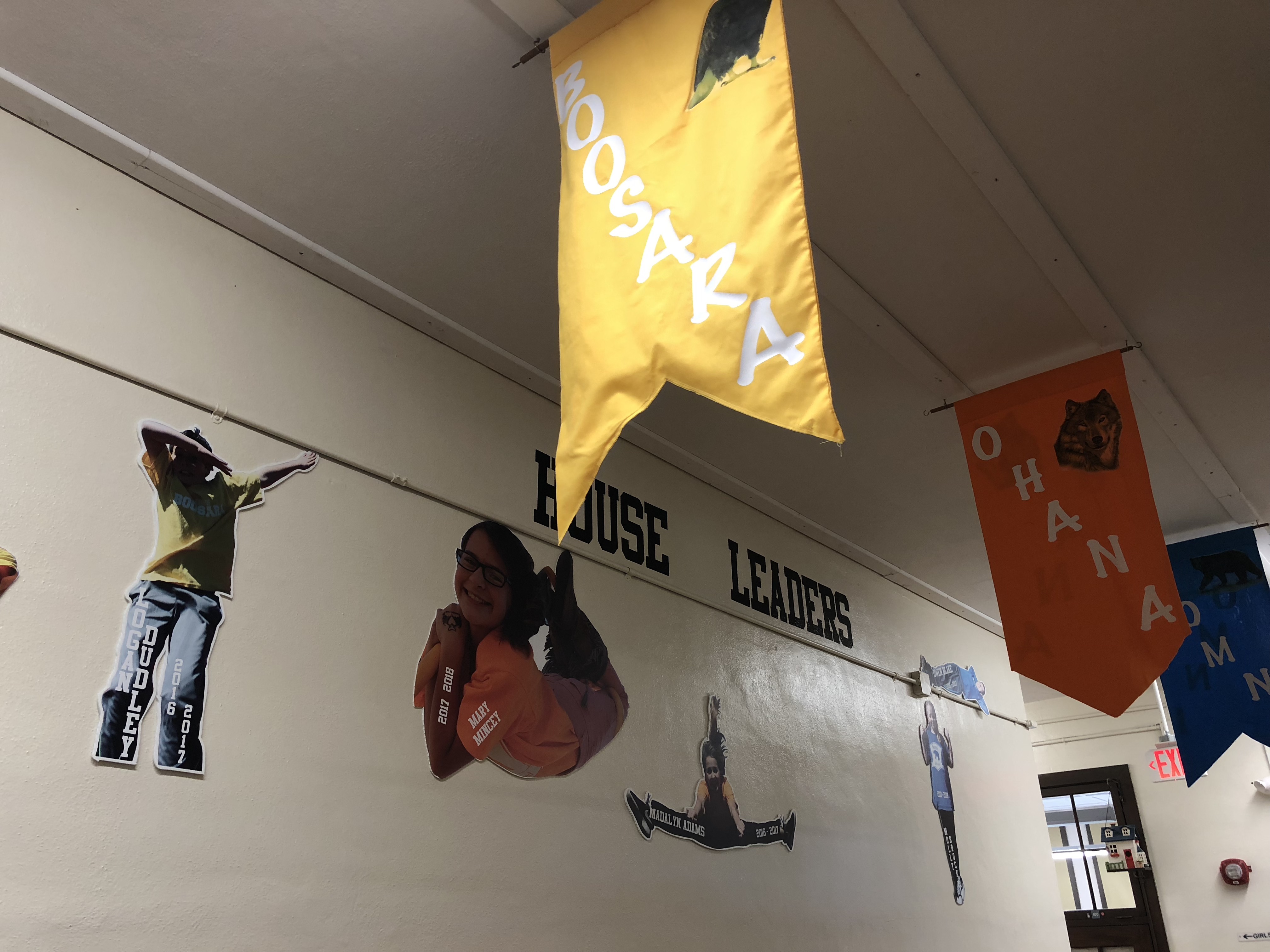-
House System Gives Students A Place To Belong
Posted by Josh Flory on 9/4/2018If you walked into Pond Gap Elementary School on a recent Friday morning, the all-school meeting in progress may have been a little confusing.
With 4th-grade teacher Jamie Dailey acting as master of ceremonies, a small group of students took turns choosing a glow stick from a toy hat and then breaking it above their heads.
When the color was revealed, Dailey would call out a strange-sounding name -- “Bujari!”, “Ujasiri!”, “Scoperta!” or “Midnimo!” -- and a different group of students seated on the gym floor would start cheering.
Fans of the Harry Potter series of books and movies probably recognized what was happening, though. At the fictional Hogwarts boarding school, a magic sorting hat assigned Harry and his classmates to one of four “houses”, which functioned as smaller communities within the school.
 4th-grade teacher Jamie Dailey looks on as a Pond Gap Elementary School student breaks a glow stick.
4th-grade teacher Jamie Dailey looks on as a Pond Gap Elementary School student breaks a glow stick.Pond Gap and some other Knox County schools have adopted a similar idea, but it’s not just for fun. Instead, teachers and administrators say the house system has had a measurable impact on students’ behavior and has promoted a sense of belonging within the schools.
“It’s made a big difference, especially in our officer referrals and behaviors,” said Aaron Maddox, principal of Corryton Elementary School.
Maddox said Corryton is in its third year of the initiative, which has created six houses within the school. Before it was implemented, he said Corryton had around 140 office referrals for behavior issues, but that number had dropped to 40 referrals last year.
Maddox even keeps a whiteboard in his office that shows the number of days each house has gone without an office referral for one of its members.
The system looks a little different in each participating school, but the broad outlines are similar. One key element is to award points for positive behaviors, and to track those points on a house-by-house basis, which gives students a sense that their actions have an impact on a larger community.
At Corryton, the morning assembly starts with the song of the previous week’s winning house, and students get points for wearing that house’s colors on Tuesday.
 House banners are displayed in a hallway at Corryton Elementary School.
House banners are displayed in a hallway at Corryton Elementary School.At Pond Gap, Principal Shelly McGill’s team of teachers and administrators will give good-behavior tickets for everything from picking up litter to paying attention in class. The tickets can be spent at a school store on Fridays, and are then converted to house points.
Dailey, who helped spearhead the Pond Gap program along with 2nd-grade teacher Liz Love, said one goal is to create an environment where students want to be at school, and that the house system provides an incentive for students who may not feel a sense of belonging elsewhere.
At the same time, schools are watchful to ensure that house pride doesn’t get out of control. During the sorting ceremony, Dailey reminded students that “even though we are four houses, we’re one family.”
“It is so important that they have that sense of community within their houses,” she said later, “but it’s even more important that we support each other and that we show good sportsmanship and that we’re teaching them that even though you didn’t win, we can still be happy for our friends.”
A 5th-grade student named Denisha echoed that point in an interview. A member of the safety patrol, Denisha was quick to point out that “When we all combine, we’re one family,” and said it’s almost like being siblings.
“We compete, but we don’t fight,” she said. “We don’t brag. When Scoperta won, we congratulated them, we sang their house song.”
The house system has been popularized in Knox County partly through the Ron Clark Academy, a non-profit middle school in Atlanta that serves as a demonstration school for teachers and administrators from across the country.
Lana Lowe, the principal of Dogwood Elementary School, said it launched a house system after a visit to the academy. The initial goal was to promote a sense of community and fun, but she said they soon realized that it could also be a teaching tool.
Lowe said the house system is one piece of the puzzle in their effort to reduce office referrals, along with strategies such as a Social and Emotional Learning curriculum and Positive Behavioral Interventions and Supports.
She said Dogwood has seen a decline in office referrals, and that this year one goal is to promote higher school attendance.
In addition to being the principal, Lowe pointed out that she’s a member of the House of Ipsum -- a reminder that teachers and administrators are also invested in the houses.
Lowe said buy-in from school staff is crucial to making the system successful: “If we’re not into it and we’re not pumping it up and we’re not excited about our house, we can’t expect (students) to be excited about theirs.”
 First-grade teacher Chase Valentine holds the house trophy during a sorting ceremony at Pond Gap Elementary School.
First-grade teacher Chase Valentine holds the house trophy during a sorting ceremony at Pond Gap Elementary School.
Select a School...
Select a School
- A.L. Lotts Elementary (es)
- Adrian Burnett Elementary School (es)
- Amherst Elementary School (es)
- Austin-East Magnet High School (hs)
- Ball Camp Elementary School (es)
- Bearden Elementary School (es)
- Bearden High School (hs)
- Bearden Middle School (ms)
- Beaumont Magnet Academy (es)
- Belle Morris Elementary School (es)
- Blue Grass Elementary School (es)
- Bonny Kate Elementary School (es)
- Brickey-McCloud Elementary School (es)
- Career Magnet Academy (hs)
- Carter Elementary School (es)
- Carter High School (hs)
- Carter Middle School (ms)
- Cedar Bluff Elementary School (es)
- Cedar Bluff Middle School (ms)
- Cedar Bluff Preschool (p)
- Central High School (hs)
- Chilhowee Intermediate School (es)
- Christenberry Elementary School (es)
- Copper Ridge Elementary School (es)
- Corryton Elementary School (es)
- Dogwood Elementary School (es)
- Dr. Paul L. Kelley Volunteer Academy (hs)
- East Knox County Elementary School (es)
- Fair Garden Family Center (p)
- Farragut High School (hs)
- Farragut Intermediate School (es)
- Farragut Middle School (ms)
- Farragut Primary School (es)
- Fort Sanders Ed. Development Center (p)
- Fountain City Elementary School (es)
- Fulton High School (hs)
- Gap Creek Elementary School (es)
- Gibbs Elementary School (es)
- Gibbs High School (hs)
- Gibbs Middle School (ms)
- Green Magnet Academy (es)
- Gresham Middle School (ms)
- Halls Elementary School (es)
- Halls High School (hs)
- Halls Middle School (ms)
- Hardin Valley Academy (hs)
- Hardin Valley Elementary School (es)
- Hardin Valley Middle School (ms)
- Holston Middle School (ms)
- Inskip Elementary School (es)
- K.A.E.C.
- Karns Elementary School (es)
- Karns High School (hs)
- Karns Middle School (ms)
- Karns Preschool (p)
- L&N STEM Academy (hs)
- Lonsdale Elementary School (es)
- Maynard Elementary School (es)
- Mill Creek Elementary School (es)
- Mooreland Heights Elementary School (es)
- Mount Olive Elementary School (es)
- New Hopewell Elementary School (es)
- Northshore Elementary School (es)
- Northwest Middle School (ms)
- Norwood Elementary School (es)
- Pleasant Ridge Elementary School (es)
- Pond Gap Elementary School (es)
- Powell Elementary School (es)
- Powell High School (hs)
- Powell Middle School (ms)
- Richard Yoakley School
- Ridgedale School
- Ritta Elementary School (es)
- Rocky Hill Elementary School (es)
- Sarah Moore Greene Magnet Academy (es)
- Sequoyah Elementary School (es)
- Shannondale Elementary School (es)
- South Knoxville Elementary School (es)
- South-Doyle High School (hs)
- South-Doyle Middle School (ms)
- Spring Hill Elementary School (es)
- Sterchi Elementary School (es)
- Sunnyview Primary School (es)
- Vine Middle Magnet School (ms)
- Knox County Virtual School (hs) (es) (ms)
- West Haven Elementary School (es)
- West High School (hs)
- West Hills Elementary School (es)
- West Valley Middle School (ms)
- West View Elementary School (es)
- Whittle Springs Middle School (ms)

